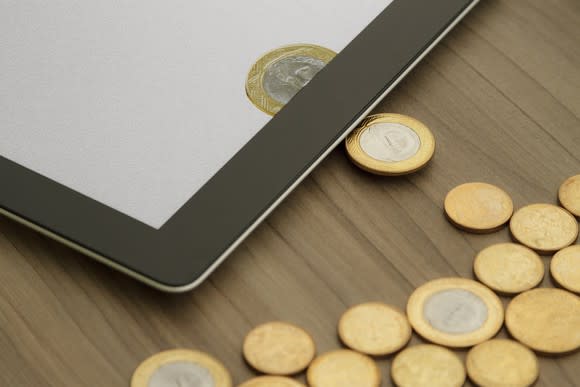The First Cryptocurrency Dividend in History Just Fell Flat on Its Face
Historically, the stock market has been the greatest creator of wealth. Inclusive of dividend reinvestment, stocks tend to return an average of 7% annually, which works out to an expectation of doubling your investable wealth about once every decade. Then bitcoin and other digital currencies came along and left stocks in the dust.
Bitcoin leaves the stock market eating its dust
Year to date, through midday Oct. 11, bitcoin is up nearly 400%, and since hitting its lows in 2015, the most popular cryptocurrency has tacked on over 1,800%. By comparison, it's taken the S&P 500 about 25 years to deliver the same return as bitcoin in a span of two years. It's no wonder investment dollars have been flowing into digital currencies.

Bitcoin's $80 billion-plus market cap isn't entirely momentum-based, either. Tangible catalysts such as a weaker U.S. dollar and blockchain technology interest have fueled its run.
When the dollar falls, investors looking to shore up their wealth will usually seek the safety of gold, since it's a finite resource. But with bitcoin having protocols that limit the number of coins that can be mined to 21 million, it, too, is viewed as a finite resource. As a result, it's been something of a safe-haven investment recently.
Blockchain, which is the digital and decentralized ledger that records transactions without the need for a financial intermediary, is also drawing a lot of interest. These open-source networks are designed to be secure, and they may represent the future for peer-to-peer and business-to-business transactions. Bitcoin's recent software upgrade designed to boost the capacity and speed of its blockchain network, while also lowering transaction costs, could make it a go-to source for enterprise customers that are looking into the possibilities of blockchain technology for their business.
Bitcoin-based stocks are cashing in, too
Digital investors aren't the ones cashing in on the bitcoin craze. Stock-based equities that deal with bitcoin have been rising at an unprecedented pace in 2017.

The Bitcoin Investment Trust (NASDAQOTH: GBTC), which is an ETF operated by Grayscale that owns a relatively fixed number of bitcoin, has rallied over 1,500% since May 2015, and more than 470% year to date. The 172,436 bitcoin the company currently has under management, utilizing a $4,850-per-coin price, works out to an $836.3 million net asset value. Yet the ETF ended Oct. 11 with a market cap of $1.07 billion. That's a nearly 28% premium over its assets that investors are willing to pay to gain access to a potentially more liquid way of owning bitcoin. Most bitcoin are traded on decentralized exchanges that can have wide bid and ask variances.
Another prime beneficiary has been First Bitcoin Capital Corp. (NASDAQOTH: BITCF), a company focused on developing digital currencies, blockchain technologies, and digital currency exchanges. Shares of the company have risen more than 8,000% over the trailing year and at one point were up more than 55,000%.
In fact, First Bitcoin Capital unveiled a first in the cryptocurrency world back in August, when it announced that it would be paying a dividend to its shareholders in the form of a cryptocurrency. In early August, the company noted that it had earned 20 million TeslaCoilCoins, and that it intended to pay regularly quarterly 10% digital cash dividends to its shareholders as long as it had a surplus of these coins.
However, this dividend, which was to have paid out two weeks ago to shareholders, appears to have fallen flat on its face.

Holy red flags, Batman!
In a press release on Oct. 4, First Bitcoin Capital noted that the dividend had been "postponed pending finalization of a workable distribution plan and subject to receipt of required regulatory approval." The press release went on to say that the "company did not anticipate the complexity associated with developing a plan to ensure that payment of the cryptocurrency dividend is made available to all beneficial owners of the company's common stock as of the record date and is working on various procedural and logistical distribution issues."
In other words, no digital dividends just yet for shareholders. But there's a lot more that's disconcerting beyond just the fact that First Bitcoin didn't pay its dividend as advertised.
For those who may not recall, the Securities and Exchange Commission suspended the company's shares from trading for two weeks at the end of August and first week of September. The SEC press release said: "The commission temporarily suspended trading in the securities of BITCF because of concerns regarding the accuracy and adequacy of publicly available information about the company, including, among other things, the value of BITCF's assets and capital structure." It's a bit odd following this halt that the company had no clue how "complex" paying a digital dividend would be.

What's more, First Bitcoin wasn't always involved in digital currencies. As recently as 2013, the company was primarily involved in purchasing gold assets. As of March, 31, 2017, the company had just $5,887 in cash, with the only other assets it had on its books related to mineral properties in Venezuela that were valued at $360,000.
Since it's moved into the digital realm, it really hasn't done a lot. Though it's brought a number of new coins to market, some of which are debatably gimmicky (President Trump coins -- no, seriously!), the aggregate volume on its five most prominent issued coins combined to equal just $3,600 over the past 24 hours as of Oct. 11. TeslaCoilCoin is one of its issued coins, and it has virtually no trading volume, meaning its dividend in TeslaCoilCoins looks like nothing more than a fancy way of drumming up volume and interest in one of its issued coins.
Long story short, while bitcoin itself has captivated investors, it's also created a virtual bubble among certain stock-based equities. First Bitcoin Capital has the look a dangerous stock that investors should consider avoiding at all costs. Don't let these digital dividends fool you -- this stock is fool's gold.
More From The Motley Fool
Why You're Smart to Buy Shopify Inc. (US) -- Despite Citron's Report
6 Years Later, 6 Charts That Show How Far Apple, Inc. Has Come Since Steve Jobs' Passing
NVIDIA Scores 2 Drone Wins -- Including the AI for an E-Commerce Giant's Delivery Drones
Sean Williams has no position in any of the stocks mentioned. The Motley Fool has no position in any of the stocks mentioned. The Motley Fool has a disclosure policy.

 Yahoo Finance
Yahoo Finance 